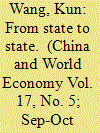| Srl | Item |
| 1 |
ID:
090938


|
|
|
|
|
| Publication |
2009.
|
| Summary/Abstract |
This paper uses a sample of Chinese listed companies whose controlling shareholders have changed from government agencies to state-owned enterprises (SOEs), to examine whether reducing government intervention while maintaining government's ultimate control could improve firm performance. The results show that the overall performance of these firms improves after the transfer of their controlling shareholders, due to improvements in both operating and non-operating performance. When we separate all samples into solely SOEs and other SOEs based on the controlling shareholder, we find that operating performance improved significantly in the solely SOE group, whereas non-operating performance improved significantly in the SOE group. In addition, we identify sources of performance improvement from two perspectives: corporate governance and related party transactions. The results imply that the Chinese Government should continue to decentralize control and, at the same time, continue to monitor firm operating efficiency.
|
|
|
|
|
|
|
|
|
|
|
|
|
|
|
|
| 2 |
ID:
103914


|
|
|
|
|
| Publication |
2011.
|
| Summary/Abstract |
We extend the current empirical literature on privatization by exploring the effect of ultimate privatization on the performance of Chinese listed companies. Ultimate privatization is defined as the incidence of transferring the ultimate control of a state-owned company from the government to private owners. Using a sample of 127 Chinese listed companies that have had controlling blocks transferred from the government to private owners, we show that firm performance improved significantly following this transfer. In addition, gains in profitability and efficiency are more prominent when the new controlling shareholder is an "outsider", one who does not own shares in the company prior to the transfer of control. Our results suggest that the Chinese government should continue to reduce its controlling ownership in listed companies, as the transfer of control to private owners enhances operating efficiency and profitability.
|
|
|
|
|
|
|
|
|
|
|
|
|
|
|
|